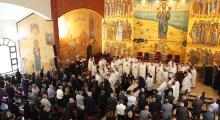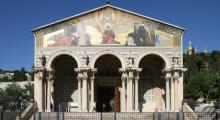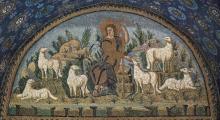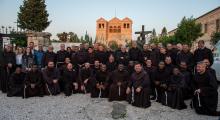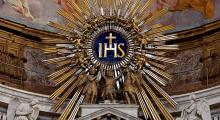Issued by the Catholic Center for Studies and Media - Jordan. Editor-in-chief Fr. Rif'at Bader - موقع أبونا abouna.org
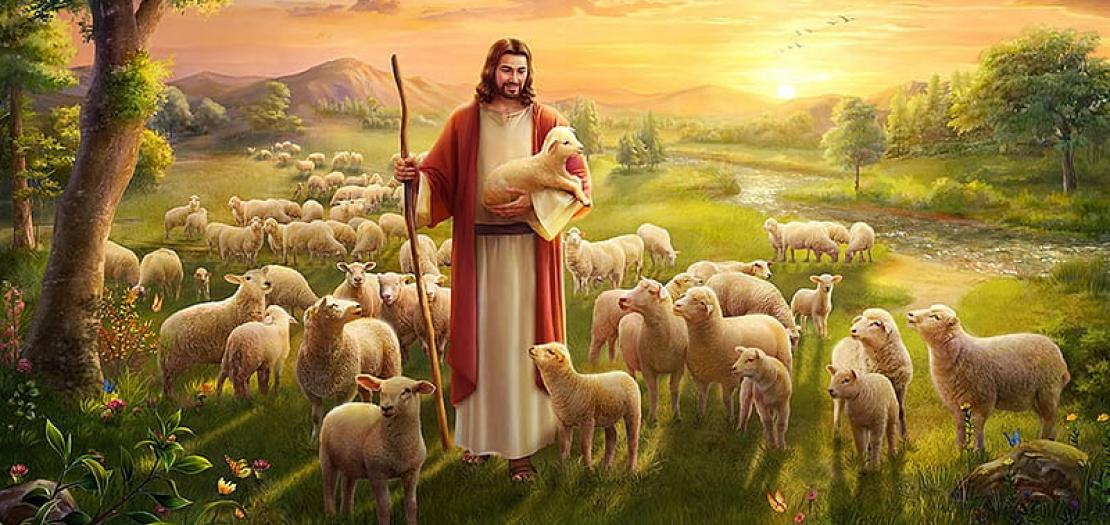
Following is the text of the meditation by Latin Patriarch of Jerusalem His Beatitude Pierbattista Pizzaballa for the 4th Sunday of Easter Season, May 8, 2022, Year C:
The first Sundays of Easter Time gave us opportunity to listen to Gospel passages relative to encounters of the Risen Lord with His disciples.
Today we begin to see what the new life is of the resurrected, what the vocation of believers is for those whom the Risen Lord makes sharers in His new life.
The passage we hear today is taken from Chapter 10 of John, a chapter in which the evangelist recounts Jesus’ discourse on the Good Shepherd.
In the first part (Jn 10:1-18), Jesus outlines the physiognomy of the Good Shepherd; then comes an interval (John 10:19-24) that tells the reactions of the Jews to these words, with their singular question on Jesus’ identity : “How long are you going to keep us in suspense? If you are the Messiah, tell us plainly.”
The verses we read today are Jesus’ answer to this question and, as often happens, Jesus reverses the question.
First of all, He says that to know Him, to really know if He is the Christ, it’s necessary to be part of the flock (“my sheep”, 27, “my Father has given them to me”, 29). There is no knowledge that can remain external, intellectual knowledge, a knowing that does not involve life, that does not compromise; the knowledge of Jesus passes through love, through a relationship of trust and surrender, through a following characterized by humble obedience; this, indeed, it is the relationship of Jesus with the Father (John 10:18).
Staying with the metaphor of shepherd and sheep, Jesus uses a few expressions: two tell of the dispositions and actions of the disciples towards Him; and two others tell what He does for them.
The disciples basically do two things: they listen, and they follow (My sheep listen to my voice and I know them, and they follow me”, 27).
Listening and following are the essence of discipleship, of new life, and are profoundly related to each other: we follow in the degree that we hear.
The shepherd does two other things, they’re also fundamental: he knows, and he gives life (“I know them”, 27; “I give them eternal life”, 28). He has a relationship of profound intimacy with His own, therefore there is a personal relationship with each disciple. And this relationship is achieved thanks solely to the free gift of His life.
These verses show the existential side of this relationship.
The new life, which arises from a relationship with the Lord, has precise characteristics: to be an assembled community (“they listen to my voice”, 27). The call of Christ leads them to a new relationship with Him (“I know them”); a relationship that in turn leads to a new style of life (“they follow me”). It is a gifted community (“I give them eternal life”, 28), the new life of the Kingdom belongs to them; and a secure community (“and they will not perish”, 28).
Not the security of those to whom is promised that nothing annoying or dangerous will ever happen, rather the security of those who know that their life is kept in good hands.
So, Jesus says that this life will never perish (John 10:28).
Jesus first had this experience in His relationship with the Father: He entrusted Himself to Him, He listened to Him, and His life did not perish; it passed through death, but the Father did not abandon Him in His power and gave Him life again. Jesus experienced that the relationship with the Father is a secure, faithful relationship.
And it is this relationship that He now wants to give to His disciples, who are therefore called to listen to the Lord and follow him in this experience of trust, so they pass through death and discover, with amazement, that their life is not only not lost, but it becomes eternal, true.
In the two verses of today’s Gospel, hands are mentioned twice: those of Jesus (Jn 10: 28) and those of the Father (Jn 10.29): hands often appear in the Easter Gospels.
They are hands that have received everything, that have passed through death of which they bear glorious signs. And now, precisely because of this, they are capable of guarding everything, without losing anything of what the Father has poured out.
+ Pierbattista


